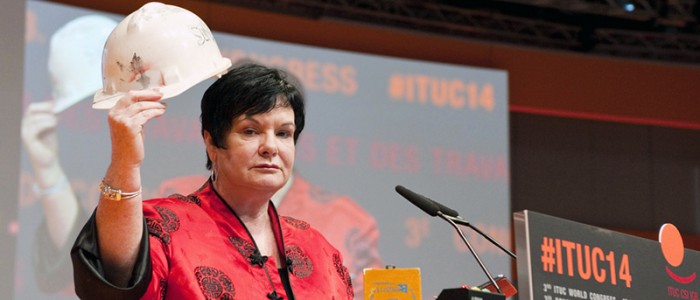ITUC Secretary General Sharan Burrow writes in the Huffington Post
When FIFA made a commitment to align itself with the UN Guiding Principles on Business and Human Rights, no one could imagine how the crisis-ridden organisation could deliver on that promise.
Into the gap between rhetoric and reality stepped John Ruggie, the Harvard Professor and former assistant secretary general at the United Nations, who developed the very principles which FIFA had committed to uphold.
An advisory contract between FIFA and the Harvard Kennedy School of Government, where Ruggie teaches, was agreed as FIFA’s top leadership were arrested or deposed and while thousands of workers who are building the 2022 World Cup facilities and infrastructure are virtually imprisoned in the slave state of Qatar.
Forced to live in squalor with poor quality food and often inadequate amounts of clean water workers in Qatar are paid poor wages and often not paid for months on end. No worker can leave an unsafe or abusive work environment or even exit the country without the employer’s permission.
FIFA knew all of this when it ignored alleged corruption in the voting practice and awarded the World Cup to Qatar. They didn’t care and for five years have ignored any responsibility for demanding an end to the Kafala system of modern slavery and for ensuring the respect for human and labour rights that the UN Guiding Principles on Business and Human Rights upholds.
FIFA stood by and watched the vital infrastructure for the 2022 World Cup including roads, rail lines, hotels, malls all be constructed or maintained by the use of men and some women who had no freedom, were denied fundamental rights and aretreated as less than human.
But today the report by John Ruggie for FIFA lays out their responsibility for respecting human rights.
Ruggie’s straight talking language which has brought together the sometimes incompatible world of business and human rights has defined for FIFA’s elected officials, staff and member organizations exactly what human rights means.
“Internationally recognized human rights include rights to life and physical security, non- discrimination, rights to freedom of thought, expression and religion, freedom of assembly and of movement, rights to education and work, to family life and privacy, to food and water, freedoms from torture, slavery or forced labor, as well as rights to fair and decent working conditions, including freedom of association and the right to bargain collectively.”
This could change everything.

